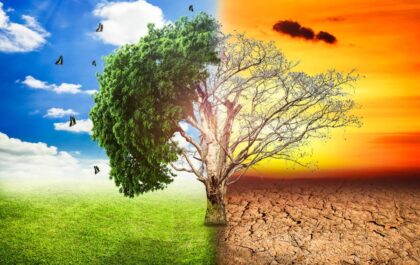A new environmental report has warned that up to five per cent of Africa’s population equivalent to around 100 million people could be forced to relocate by 2050 due to the worsening impacts of climate change.
The findings are contained in the State of Africa’s Environment Report 2025, released in Addis Ababa by the India-based Centre for Science and Environment (CSE). The report presents comprehensive data on climate-related migration, land degradation, and rising sea levels across the continent.
“Africa, in fact, would have the highest rate of displacement or migration due to impacts of climate change,” the report states.
Drought, Floods and Sea Level Rise Driving Displacement
Extreme weather events are already reshaping lives in several regions. In Somalia, years of prolonged drought have devastated agricultural livelihoods, pushing millions into displacement camps or urban centers in search of food and water.
Nigeria has also faced severe climate shocks. In 2022, floods killed over 600 people and displaced 1.4 million, damaging homes, farmland, and infrastructure across large swathes of the country. Communities along the Niger and Benue rivers remain particularly exposed as rainfall becomes increasingly erratic.
Coastal erosion is compounding the crisis. Rising seas have already submerged parts of villages, and projections show sea levels could rise by 0.3 meters by 2030, threatening 117 million Africans. Under current global warming trends, this could increase to a full meter by the end of the century in a worst-case scenario.
Between 2020 and 2030, population growth in Africa’s seven largest coastal cities Lagos, Luanda, Dar es Salaam, Alexandria, Abidjan, Cape Town, and Casablanca is projected to rise by 40%, from 48 million to 69 million. Port Harcourt, Nigeria, could see a 53% increase alone.
Expanding Deserts and Intensifying Storms
Climate change is also driving desertification in countries such as Niger, Chad, and Burkina Faso. As arable land shrinks, farmers and pastoralists are moving south into more densely populated regions, increasing the risk of conflict over scarce resources.
In 2019, Cyclone Idai displaced nearly 600,000 people in Mozambique, Zimbabwe, and Malawi, killing 783. Scientists say such events are likely to become more frequent and more intense due to climate change.
The Groundswell Model cited in the report suggests that 32 million people in West Africa could become internal migrants by 2050 due to water scarcity, declining land quality, and rising seas. Under worst-case projections, Niger could see 19.1 million people move within the country, Nigeria 9.4 million, and Senegal 1 million. The West African coastal belt alone could see 2.2 million people displaced.
Climate Crisis Threatens Food Security
The report links climate pressures to a significant drop in agricultural productivity, with an 18% decline reported across the continent. Cocoa production, vital to economies in West and Central Africa and responsible for 70% of global supply, is particularly vulnerable.
If global temperatures rise by 2°C, the report warns that up to half of Africa’s population could face undernourishment.
Leaders Call for Bioeconomy and Climate Adaptation
At the report’s launch, Professor Kassahun Tesfaye, Director General of the Bio and Emerging Technology Institute in Ethiopia, said the findings underscore the need for a shift towards sustainability.
“The data in this report, while alarming, also points the way forward,” he said. “It shows that our greatest liability our natural resources and land is also our greatest asset to build a sustainable bioeconomy.”
He described the bioeconomy as “an economic system that uses renewable biological resources to produce food, materials, and energy a circular economy where waste becomes a new beginning.”
CSE Director General Sunita Narain said African countries are showing progress in adapting to climate challenges.
“Change is taking shape in Africa. Every African nation now has some adaptation programme to showcase—from net-zero carbon strategies to indigenous knowledge systems tackling drought and extreme weather,” she noted.
Dr Rita Bissoonauth of UNESCO called the report “a moral compass”, highlighting that climate change causes direct economic losses of $1.18 billion annually in North Africa and $1.25 billion in sub-Saharan Africa.
Ethiopia’s Climate Adaptation in Focus
Ethiopia’s Deputy Director General of the Environment Protection Authority, Nigussu Lema, said the country is strengthening resilience through its National Adaptation Plan (NAP-ETH), which integrates climate adaptation into broader development strategies.
Reported by:
BONAPARTE RANSFORD









